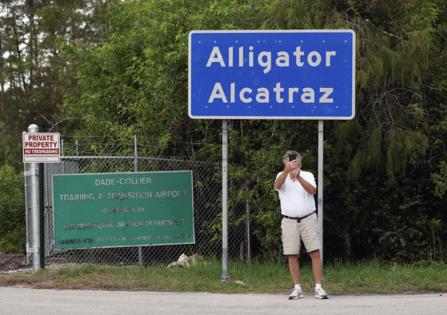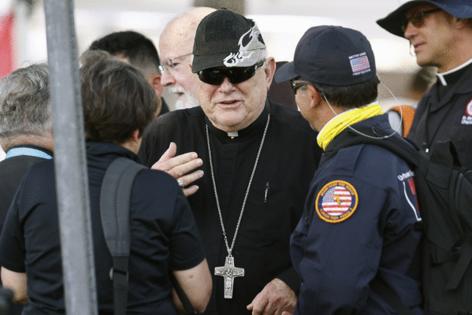Trump-loathing billionaire teams with archbishop to fight deportations
Published in News & Features
For nearly 50 years, Miami Archbishop Thomas Wenski has ministered to immigrants who fear being forced to leave the U.S. But the unease in his community now, as President Donald Trump presses for the biggest deportation effort in U.S. history, is unlike anything he has ever seen before.
Miami, home to large numbers of immigrants from Cuba, Haiti and Venezuela, among other countries, is a prime target of Trump’s dragnet. Thousands of people in the region could face deportation as the administration seeks to end protections for migrants from countries roiled by war or disasters.
“There certainly are people living in fear in this community,” Wenski said in an interview. “They’re living in fear of a knock on the door in the middle of the night.”
When federal agents are rumored to be conducting raids in the area, attendance at mass declines, Wenski said. The Miami office of U.S. Immigration and Customs Enforcement has logged 15,000 arrests since Trump took office in January, more than any other of the agency’s regional locations, according to federal data compiled by the University of California at Berkeley’s Deportation Data Project.
Wenski, 74, has taken an active role — with help from a Trump-loathing local billionaire — in trying to protect and provide comfort to immigrants who fear being caught up in ICE’s sweeps. He helped expand a Church program that provides free legal advice to immigrants facing deportation. And he pressed Florida to allow clergy access to “Alligator Alcatraz,” the state-run immigration detainment facility in the Everglades.
Catholic leaders have been critical of Trump’s deportation drive. American-born Pope Leo XIV, in his first address to world diplomats, urged respect for migrants, in a rebuke to the president. And Cardinal Robert McElroy of Washington called the administration’s immigration policy “morally repugnant” in a CNN interview.
Some wealthy Miamians, including Cuban-born billionaire Miguel Fernandez, have stepped in to provide Wenski with financial backing. Wenski and Fernandez have known each other for about 15 years, and the businessman has helped rally support from other prominent local figures who’ve been repelled by the spectacle of masked federal agents arresting workers and parents.
Miami is a city of immigrants. Some 60% of the population is foreign-born and 70% are Latinos. But it was also one of the large metropolitan areas won by Trump in the 2024 election — a sign that many members of its large and influential Cuban exile community embraced MAGA conservatism. Now, some appear to be feeling buyer’s remorse, according to Wenski.
“Most families, I think, would rather see a solution that would be less drastic than tearing up families and deporting breadwinners or mothers,” Wenski said.
The archbishop, the son of Polish immigrants, has watched immigration drama play out for decades in South Florida. When he first began his work for the church in the region, immigrants were pouring in from Haiti and Cuba, landing on local beaches in boats and rafts after perilous escapes from political turmoil at home.
Trump’s crackdown is playing out at a larger scale than those old controversies, Wenski said. He has urged the president to bring law-abiding immigrants into the economy and described enforcement tactics as “alarming.” He worries that families and communities nationwide are being torn apart.
“It’s national,” Wenski said, sitting in his office in the Catholic archdioceses in Miami Shores. “It’s going to cause a lot of heartbreak, and I think it’s going to hurt the country.”
The White House says Trump is delivering on pledges to deport immigrants who have been convicted or charged with crimes. “The American people overwhelmingly reelected President Trump based on his promises to enforce immigration law, and now he is carrying out the agenda he was given a mandate to implement,” said Abigail Jackson, a White House spokeswoman.
Wealthy Backers
Fernandez, who goes by Mike, earlier this year gathered a group of Cuban-Americans in his Coral Gables mansion on Biscayne Bay. Hunkered down in his mahogany-lined library, the group agreed Trump had gone too far, but were reluctant to challenge him publicly.
Despite those reservations, they collectively ponied up $250,000, plus $50,000 from Fernandez. Half went to the church’s Catholic Legal Services of Miami, which has 30 staff lawyers who give free help to 3,000 immigrants a month in detention camps or facing deportation. Fernandez declined to name the group’s members.
Fernandez, 73, is a Republican-turned-independent who built his fortune buying and selling health-care companies. When he was 12, Fidel Castro’s police interrupted his family’s Christmas Eve dinner and forced them on to a military plane. They were dumped in Mexico City with no money or passports and took refuge in a convent. His family later secured asylum in the U.S. and settled in New York.
Fernandez said he was compelled to act by echoes of his past that he sees in the people Trump is eager to push out.
“I happen to be one of those immigrants who arrived in this country penniless,” he said, sitting in an overstuffed leather chair in his library, with vintage machine guns and hunting trophies lining the walls. “I see myself in those people who are being detained today.”
Along with giving to charities, Fernandez has embraced noisier ways of resisting Trump’s crackdown. Earlier this year, he put up billboards in Miami calling Trump a dictator.
Fernandez also rescinded $11 million of donations to Miami Dade College and Florida International University after the schools cut aid for undocumented immigrant students. Fernandez had lobbied for a 2014 law that allowed immigrants who went to high school in Florida to qualify for in-state tuition, but a state immigration law that Governor Ron DeSantis signed this year eliminated the program.
DeSantis’ office and the two colleges didn’t respond to requests for comment.
Historical Echoes
Fernandez, who dropped out of the University of New Mexico to volunteer for the U.S. Army’s 82nd Airborne Division during the Vietnam War, built his own private equity firm, MBF Healthcare Partners. He says his family’s wealth is now well over $1 billion. His sprawling mansion — which he values at $250 million — sits on eight acres dotted with orchids, a Fernando Botero sculpture and a landscaping feature made from a makeshift raft used by Cuban migrants that washed up in his yard.
Fernandez has donated millions to Republicans over the years, though never to Trump. He said that his politics contrast with most of his friends among Miami’s Cuban-American elite, many of whom played a big part in helping Trump carry the region in 2024.
Other activists in South Florida have welcomed Fernandez’s engagement and willingness to spend.
“The silence is just so deafening,” said Ana Sofia Pelaez, a Cuban-American activist. “We need more people like Mike Fernandez to speak out. If not, Miami is not going to be Miami anymore.”
Wenski has watched waves of immigrants arrive in his diocese since he was ordained in 1976. At that time, Haitians fleeing the Duvalier regime were arriving in boats on the Florida coast. Wenski learned Creole and organized places of worship for them — and watched as many were deported. Then, he saw thousands of Cubans who arrived in the 1980 Mariel Boatlift sent home.
“In a lot of ways, what we’re going through on a national level parallels somewhat the situation in Miami in the early 80s,” he said.
In July, Florida officials refused to let clergy to visit “Alligator Alcatraz,” the controversial detainment camp DeSantis erected in a show of allegiance to Trump. Determined to reach the camp’s detainees, the archbishop tried another tack.
An avid Harley-Davidson fan, Wenski and 25 fellow members of the Knights of Columbus rode their motorcycles along a two-lane highway slicing through the Everglades to the camp. Standing outside, the men bowed their heads as Wenski stood near his Harley and led a rosary prayer for the detainees.
A week later, Florida relented, and Wenski sent a priest back. Amid the complex of tents containing bunks inside cage-like enclosures of chain-link fencing, the priest gathered 150 immigrant detainees in the camp’s cafeteria and gave Catholic mass. By the time he was done, the camp’s directors asked for him to return, not just to counsel detainees but also workers, far from family, at the remote detention site, Wenski said.
Wenski hasn’t had the chance to discuss his concerns about the immigration crackdown with Trump or leaders inside his administration directly, but he’s convinced little gains like giving mass in the Everglades resonate. His X post about the trip on his Harley to Alligator Alcatraz drew about 1.6 million views.
“I’ve never met with Trump to discuss any of this,” he said. “But, I hope he’s heard me.”
____
—With assistance from Hadriana Lowenkron.
©2025 Bloomberg News. Visit at bloomberg.com. Distributed by Tribune Content Agency, LLC.










Comments